Sorcery Killings In Papua New Guinea
As you can see from out latest news section of the website hardly a day goes by without reports of witchcraft accusations, ritual killings and various other forms of human rights abuses that take place each day throughout the world due to the beliefs in witchcraft and spirit possession. However, occasionally, one of these many stories captures the imagination of the international media and becomes massive news across the world. This has certainly been the case with the recent killing of Kepari Leniata who was horrically mudered after being accused of killing a 6 year-old neighbour with “sorcery”.
As news of this murder and others spread across the world, the Papua New Guinean government came under increasing pressure to act. First the UN condemned the violence against women and called for more legislation, then Amnesty demanded an end to the brutal killings and today a national day of mourning, a haus krai (house of mourning), will be to highlight the violence and suffering of women in Papua New Guinea (PNG) through allegations of witchcraft, rape, and murder. WHRIN’s thoughs and solidarity lie with the people of PNG today.
In response to the international outrage generated by these brutal mrders the PNG government has reacted quickly to try to address the terrible damage that has been done to its reputation, firstly by looking to punish any offenders (one has just received a 30 year prison sentence) and then looking to repeal the countries Sorcery Act, which criminalises the practice of sorcery. Many feel that this act gives the belief in sorcery credibility and therefore promotes these forms of human rights abuses.
Enacting legislation and enforcing the rule of law seems to be a fairly standard response by governments who are trying to deal with terrible PR caused by such abuses. This was certainly the case during my experience in Nigeria where the Akwa Ibom State Government quickly enacted the child rights act and criminalised the act of branding children as witches after the international outrage that the documentary – Saving Africa’s Witch Children – generated. Whilst, in many ways, this was an incredible achievement by a group of small NGOs the belief in child witches will not go away overnight and the battle to put a stop to these forms of abuse is far from over, despite Governor Akpabio claiming that the state is now “witch-free”.
In Nigeria, as I suspect is the case in PNG, what is really needed to stop such superstitious beliefs prevailing is higher literacy levels, a wide-spread programme that looks to demystify the common illnesses seen to be signs of witchcraft (epilepsy, bed-wetting, autism etc etc), greater knowledge of human rights and the authority of faith leaders being questioned and being held to account. One can only hope that such steps would contribute to a decrease in superstitious beliefs and therefore lower the levels of human rights abuses that take place due to these beliefs. Certainly legislation and law enforcement alone will not put a stop to these horrific crimes.
At this point I must thank Vlad Sokhin for getting in touch recently and sharing some of his, very powerful, photos that he has taken on the issue of sorcery related abuses in PNG. His work once again highlights to me the real importance of getting quality images of these forms of abuse if we are to ignite further international attention on these issues and work to ensure that solutions are developed to prevent such terrible, terrible cases from arising again. please be warned that some of the images are pretty hard-hitting. Even for me as someone who has seen lots of similar such images they really disturb me, especially the one of the woman on the stage in front of the crowd. Unbelievable that this sort of stuff is happening in the 21st century……………..
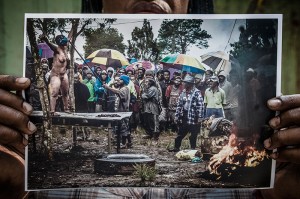
A woman advocate shows a photo of the torture of a woman, who was accused of being a sorcerer by people from her village. The torture happened in August 2012 in the Highlands Region. The crowd undressed the victim, tied her up to a tree, beat her and burned her body with hot iron bars, planning to burn her alive. The violence was interrupted and the woman survived. Pictures of the torture were taken by a man from the crowd with a snapshot camer
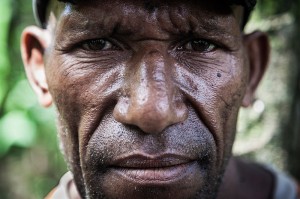
Ilai Nul (61), from Wara Simbu village in the Highlands Region of PNG. In 1982 he killed an old woman accused of sorcery. Before the murder, he cut all her fingers and thumbs, one by one, forcing her to admit the fact that she had been involved in witchcraft.
- Billy Kuipa (70) from the Giu village was a victim of a sorcery attack in September 2008. Billy’s family was accused in practicing black magic and locals killed his second wife, then threw him from the window into the street and mutilated his body with big knifes. Two of his tormentors were caught by police and are in prison now. Billy is still looking for his other torturers to take a reveng
Emate with her youngest son Dikon. She was accused of using sorcery to kill her husband by her elder sons. She survived the brutal attack, but had to pay for her own treatment.
If you feel moved to act by these shots, one thing that you can do is sign Amnesty’s petition here . Many people seem to be cynical about the power of petitions to change anything. However from my first-hand experience I know that governments in placves like PNG are very image conscious and the power of the global community to pressure them to act really should not be underestimated so please do take 30 seconds out of your day to sign the petition. Many thanks!

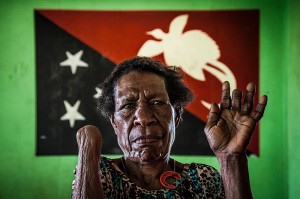
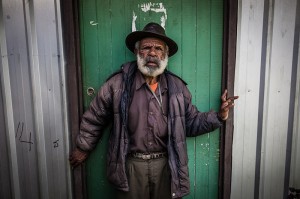
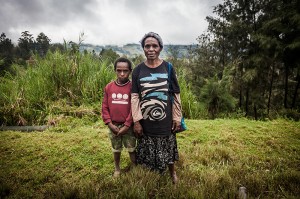
No comments yet
Comments are closed